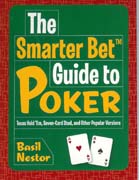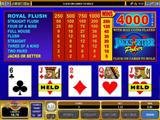
Smarter Bet Guide to Poker
by Basil Nestor
Strategy is the key to success at the poker table. Nestor gives you professional strategies for winning and helps makes poker easy to learn. Everything is here in a clear-cut format: Starting hands, profitable table conditions, dangerous card combinations, techniques for reading opponents, and much more. Quite a bit of information packed into a small format.
Play Video Poker at Roxy Palace
If you are looking for the extra edge that goes with knowledge, Roxy Palacel can help you learn what you need.
Can You Beat Poker Regulars?
by Basil Nestor
Q I play poker on the weekends, usually at a card club or casino. Some nights I do okay, but some nights are just awful. The worst losses come when the "regulars" (people who play during Basil Nestor is the author of the new Playboy Complete Guide to Casino Gambling. This wonderful book teaches players how to avoid sucker bets and win more when playing gambling games. He is also the author of The Smarter Bet Guide series for video poker, slots, craps, and many other books about gambling. Basil's website is www.smarterbet.com the week) sit at my table. They're constantly beating me out of big pots. How should I handle these opponents?
Basil Nestor is the author of the new Playboy Complete Guide to Casino Gambling. This wonderful book teaches players how to avoid sucker bets and win more when playing gambling games. He is also the author of The Smarter Bet Guide series for video poker, slots, craps, and many other books about gambling. Basil's website is www.smarterbet.com the week) sit at my table. They're constantly beating me out of big pots. How should I handle these opponents?
 Basil Nestor is the author of the new Playboy Complete Guide to Casino Gambling. This wonderful book teaches players how to avoid sucker bets and win more when playing gambling games. He is also the author of The Smarter Bet Guide series for video poker, slots, craps, and many other books about gambling. Basil's website is www.smarterbet.com the week) sit at my table. They're constantly beating me out of big pots. How should I handle these opponents?
Basil Nestor is the author of the new Playboy Complete Guide to Casino Gambling. This wonderful book teaches players how to avoid sucker bets and win more when playing gambling games. He is also the author of The Smarter Bet Guide series for video poker, slots, craps, and many other books about gambling. Basil's website is www.smarterbet.com the week) sit at my table. They're constantly beating me out of big pots. How should I handle these opponents?A Remember, there is luck, and there is skill. Luck eventually turns. Skill is forever. Give a table about thirty minutes, and if too many of your opponents are playing well (they're skilled rather than just lucky), cash in and find greener pastures. Change tables, go to another casino, or quit for the night.
In short, don't try to beat the "regulars" until your game improves. It may sound adventurous to hang in there and go mano-y-mano against the best in the casino, but in most cases that's a recipe for losing. It's comparable to passing up a loose slot machine for the "challenge" of beating a tight one. It doesn't make economic sense.
When you do play against tough opponents, you should tighten up (play fewer hands) and bet more aggressively when you get into a pot.
Consider this... A hold'em poker game on a busy night typically has about nine players. That's only one in nine hands that you can reasonably expect to showdown and win. So theoretically, you should be throwing away 89% of your hands, and playing 11%. Of course, it is possible to bet aggressively and cause opponents to fold hands that they would otherwise eventually win. If you use an aggressive strategy, the overall number of playable hands increases to about 20%. But still, four out of five hands should be tossed at the beginning. That leaves you about eight playable hands per hour...of which only two or three will eventually be winners.
So you should win (on average) two or maybe three pots an hour. It's similar to playing baseball; long periods of seeming inactivity are punctuated by heart-pounding moments of extreme activity, anxiety, and exhilaration.
Also, it's important to think about the game when you're away from the game. You should keep records of the hands you play to the showdown, and review those records to find mistakes or flaws in your strategy. Most of the profit in poker does not come from bluffing or other trickery. Profit mainly comes when your opponents make strategic mistakes. Your goal is to make zero mistakes and to seek opponents who are unskilled and/or likely to make play choices that are mathematically incorrect.
For more on poker strategy, check out The Smarter Bet Guide to Poker.
Enjoy the game!
[ learn to play poker! ]

